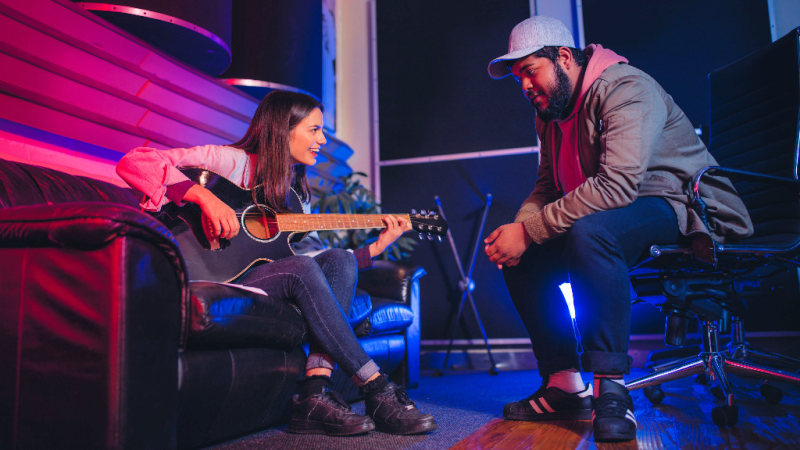A Music Producer’s Guide to the Art of Talkback
What to say on talkback and how to say it
The best music producers have highly developed emotional intelligence. If you can master building relationships with your clients and know what to say to bring out the best in your musicians, you will be on the road to success. In the recording studio, the talkback intercom from control room to the the live room is a very powerful tool to encourage, support and guide your musicians to their best performances.
So, here is my 10 point guide on what to say to artists using talkback and what to expect from them when you do.
1. Be interested
It’s a mistake to overlook that you’re not just a service provider: a music producer is a partner to the musician or songwriter. You’ve got to be interested in what they’re doing. If you’re not invested it will show in your talkback and won’t bring about the best outcome. Moreover, it’s in the interest of a music producer to create the best possible product, and your talk back is a really powerful tool to help with that.
2. Empathy: start with understanding how vulnerable being a creative musician is
Any singer or musician, no matter how experienced or how good they are, will be expressing themselves in a very vulnerable way in the recording studio. As a producer, there is always a place for thanks and praise for their contribution. Recognise that it is a privilege to be trusted with their personal expression. This empathetic mindset should guide all of your talkback comments.
3. Say thanks
Always be appreciative. Say “thank you” after each take. This supersedes whatever level your artist is working at and whether or not you like their music. Saying “thank you” shows that you respect their vulnerability and creativity. This will build mutual respect and trust.
4. Quickly calibrate your praise and always encourage!
Within the first few takes of your client’s recording session, you need to calibrate where ‘good’, ‘great’, ‘excellent’ and ‘perfect’ are going to be in relation to your artist’s ability. Never venture into negative comment and always give yourself headroom to let your praise fly higher. I’ve worked with artists of various musical abilities in the studio, from amateur to some of the best in the business, and I cannot think of an occasion when that artist wasn’t giving their best at that moment in time. No artist is too good that they don’t respond to praise. Show thanks and appreciation accordingly and you will be surprised what you then get back musically from them.
5. Use your praise to steer their performance
I’ve found that creatives are exceedingly sensitive to the word “but”. Avoid it like the plague. For example, don’t compliment and then add a “but”, e.g. “That was wonderful, but next time can you do XYZ?” That word completely nullifies the praise. Instead, highlight the tiniest glimmer of something that you heard in the take which you know will make all the difference to the recording.
Celebrate what they did as if it were in abundance. “Capture the butterfly”.
Draw their attention to what you want more of within the compliment you give. You’ll find the effect is to develop that nugget unconsciously – the praise acts as a subtle instruction to change, yet gives the artist confidence that they are already doing it, and none of the pain of feeling inadequate or like they’ve failed.
“I like the way you did …”
“I loved …”
“That felt very …[positive description]”
You’ll be surprised by how much more you get back instantly.
6. Use emotive words to enhance an emotional experience
Nothing is more powerful than a compliment to make a better recording. Emotive words are remarkably powerful, not just with heartbreak or love songs, it works just as well with aggressive music.
“I loved the way you attacked that.”
“I love how angry you got.”
7. Keep the calm if it gets stressful
We’ve all been in those sessions when tensions rise and time is running low. Stress also manifests when artists get fed up and frustrated with themselves. The best approach is to remain calm and controlled over the talkback. Speak steadily and positively with a soothing late-night DJ voice and you’ll be surprised at how this counter-balances the anxiety.
A break is better than a briefing
Be aware of what’s going on for your client. Sometimes the best move is to take a listening break with your artist. Invite them into the control room for a listen back, which ultimately is a break in disguise, and gives them a chance to reset and hear the difference between what they thought they sounded like and what they actually sound like. Often artists are surprised at how much better the plackback sounds, which can return them to a more constructive mindset. You can also utilise this in reverse, when there’s something going wrong, but the artist isn’t picking up on it. Playback is a powerful way to help the artist make their own discoveries.
8. Listen to your artist and encourage them to talk
It sounds so basic, but you need to listen to your musician’s performances, and don’t slack off. If I am recording and the engineer or producer says to me, “Yes, great, thanks. Do you want to do it again?” I can sense if that person has really listened to me or not. The talkback reflects how you treat your artist overall.
Your goal when producing their music is to live it with them. You’re building a relationship at a deep emotional level so that they can trust you with the emotions we’ve talked about. This is intense at times and requires investment from you as a producer. For instance, I can tell when a singer is holding something back – it’s in their sound – it’s an instinct that a producer needs to be attuned to. At that point I pause and invite them into the control room and we talk. I ask a few questions about the song, its story, the lyrics and what it means to them, and quite quickly this will reveal something.
Don’t be surprised or afraid of unlocking emotions tangled up there
However they may manifest, don’t take emotional reactions personally, that’s why the artist is there with you: to bring out the music and all that comes with it. Once it’s out, and everyone has recovered, it will clear the skies. Everyone will be in a better place to continue without holding back next take.
9. What to say when you don’t know what to say
“How did you find that?”
“How do you feel that take went?”
The best thing to do when you’re not sure what to say, is to throw it open to your artist and see if they offer any steer that you can hook into. You won’t have all the answers all of the time, and that’s part of the joy of this, it’s part of the learning curve for you as a producer, so long as you’ve got an inquisitive, open mind you’ll survive. So, if in doubt, ask your client how they think that take went to create an opportunity for conversation without confrontation.
10. Good talkback is not an act
In summary, even though I can describe these ‘rules’ today, I have identified them retrospectively through my 25 years’ experience in the studio, in teaching environments and from educating myself in human psychology. It must be said that you won’t be successful in applying this guidance if you are contrived and don’t really mean what you are saying. Always start from rule #1 and from a position of empathy, knowing that these rules work. Put your heart into it, and as a creative artist yourself, you will experience great success with your musicians and artists.






